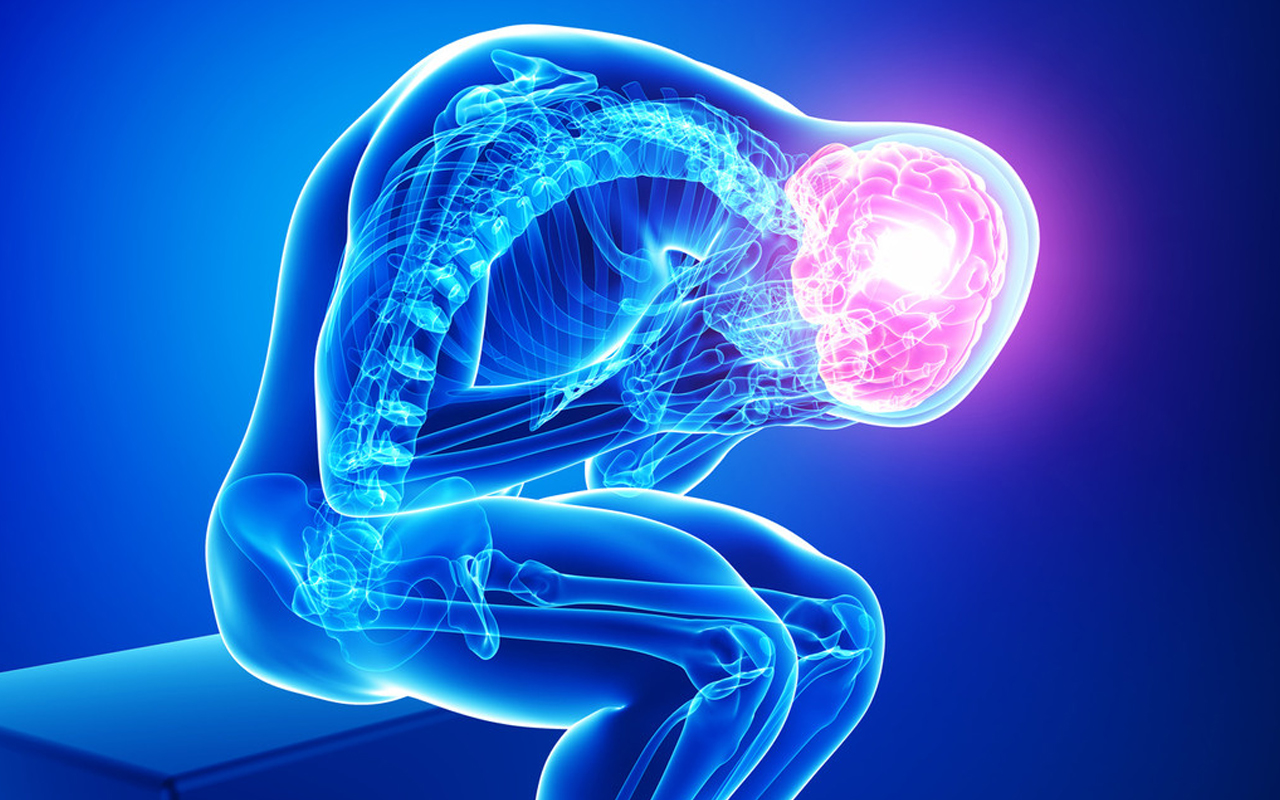Headaches
Headaches are one of the most common physical problem people experience. When headaches are severe, they often control the life of their victim by disrupting job performance, daily activities and sleep. Common types of headaches are: tension, migraine, cluster and sinus. One more type of headache which is responsible for about 15-20% headache is Cervicogenic headache.
Nearly everyone has had headache pain, and most of us have had it many times. A minor headache is little more than a nuisance that's relieved by an over-the-counter pain reliever, some food or coffee, or a short rest. But if your headache is severe or unusual, you might worry about stroke, a tumor, or a blood clot.

Cervicogenic Headache:
Many a time’s pain arising from upper neck structures (like C1-2, 2-3 joints/ nerves) might travel
in the head as a referred pain. It is vital to differentiate and treat the condition accordingly. We
differentiate & treat complex types of headache effectively.
Treatments:
Common treatment measures for cervical headache are:
Physical therapy, and especially “manual therapy” by physiotherapist.
Non-steroidal analgesics, Other pain medications like tramadol, opioids.
Muscle relaxants
Migraine prophylactic treatment (based on the overlap between cervicogenic headache and migraine).
The intractable headache which is not responding to above measures requires minimally invasive approach like-
Facet blocks and epidural blocks
Epidural injection of steroids.
Greater & lesser occipital nerve block
Botox injection for spasm
Radiofrequency thermocoagulation (RFTC)
If there is a herniated disk, or other significant structural abnormality, surgery may be
recommended. In order to determine if a destructive procedure is indicated (such as RDTC) a diagnostic ganglion block may be required.
Tension-type Headache:
Episodic tension-type headache is best treated with analgesics such as aspirin, acetominophen, and other NSAIDS. Abortive therapy is most successful, and patientsshould be instructed to take medications at the onset of symptoms.
Chronic recurrent tension-type headaches are more difficult to manage. Preventive medications: anxiolytics, SSRIs, andidepressants.
Non-pharmacologic therapies such as biofeedback, physical therapy, relaxation therapy, stress management training, and psychotherapy have also been shown to be helpful.
The intractable headache which is not responding to above measures requires minimally invasive approach like-
Facet blocks and epidural blocks
Epidural injection of steroids.
Botox injection for spasm
Radiofrequency thermocoagulation (RFTC)
Chronic recurrent tension-type headaches are more difficult to manage. Preventive medications: anxiolytics, SSRIs, andidepressants.
Non-pharmacologic therapies such as biofeedback, physical therapy, relaxation therapy, stress management training, and psychotherapy have also been shown to be helpful.
The intractable headache which is not responding to above measures requires minimally invasive approach like-
Migraine Headache:
Preventive measures: Maintain regular sleep pattern, maintain regular meal pattern, lowtyramine & low caffeine diet, coping stratergies,Moderate amount of exercise, Drink plenty of water, Limit alcohol and other drugs
Prophylactic therapy: Drugs commonly used are CCB (Flunarizine), β-blockers (Propranolol etc.), Antidepressants( Amitriptyline), Anticonvulsants(Carbamazepine, Divalproex sodium etc.) In addition to above physical therapy, stress management therapy, relaxation training etc can also help.
Abortive agents The most potent abortive agents are the Triptans(5-HT) agonist which are Cerebral vasoconstrictors (e.g. : sumatriptan, zolmitriptan etc.) Another highly effective group of antimigraine medications are ergotamine-containing drugs-ergotamine tartrate & dihydroergotamine.
Interventional Pain Management:Injections of Botulinum Toxin in the scalp prevent migraine attack for prolonged period.
Prophylactic therapy: Drugs commonly used are CCB (Flunarizine), β-blockers (Propranolol etc.), Antidepressants( Amitriptyline), Anticonvulsants(Carbamazepine, Divalproex sodium etc.) In addition to above physical therapy, stress management therapy, relaxation training etc can also help.
Abortive agents The most potent abortive agents are the Triptans(5-HT) agonist which are Cerebral vasoconstrictors (e.g. : sumatriptan, zolmitriptan etc.) Another highly effective group of antimigraine medications are ergotamine-containing drugs-ergotamine tartrate & dihydroergotamine.
Interventional Pain Management:Injections of Botulinum Toxin in the scalp prevent migraine attack for prolonged period.
Cluster headache:
Abortive therapy:Subcutaneous sumatriptan ,High dose/high flowrate oxygen
Preventive therapy: Verapamil, Lithium,methylsergide
Transitional treatments:High dose corticosteroids
Interventional pain management: For intractable cluster headache we can do different intervention like Chemical denervation of the supraorbital & Infraorbital nerves, chemical or radiofrequency denervation of gasserian ganglion, sphenopalatine ganglion block.
Preventive therapy: Verapamil, Lithium,methylsergide
Transitional treatments:High dose corticosteroids
Interventional pain management: For intractable cluster headache we can do different intervention like Chemical denervation of the supraorbital & Infraorbital nerves, chemical or radiofrequency denervation of gasserian ganglion, sphenopalatine ganglion block.
Conditions
- Migrain
- Tension
- Cluster
- Cervicogenic
- Occipital
Treatment options or interventions
- Sphenopalatine Ganglion Injection / Radiofrequency
- Greater and lesser occipetal nerve injection / radiofrequency
- Small nerve block like supraorbital, supratrochlear, infraorbital, mental, etc.
- Botox Injection
- Trigger point injection



